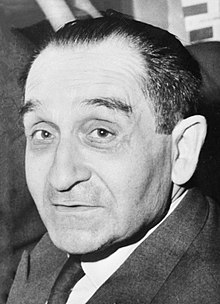Pierre Mendès-France
| Pierre Mendès France | |
|---|---|

Mendès France in 1968
|
|
| 93rd Prime Minister of France | |
|
In office 18 June 1954 – 23 February 1955 |
|
| Preceded by | Joseph Laniel |
| Succeeded by | Edgar Faure |
| Personal details | |
| Born | 11 January 1907 Paris |
| Died | 18 October 1982 (aged 75) Paris |
| Political party | Radical |
| Religion | Jewish |
Pierre Mendès France (French: [pjɛʁ mɑ̃dɛs fʁɑ̃s]; 11 January 1907 – 18 October 1982) was a French politician who served as President of the Council of Ministers for eight months from 1954 to 1955. He represented the Radical Party, and his government had the support of the Communist party. His main priority was ending the war in Indochina, which had already cost 92,000 dead, 114,000 wounded and 28,000 captured. Public opinion polls showed that in February 1954, only 7% of the French people wanted to continue the fight to keep Indochina out of the hands of the Communists, led by Ho Chi Minh and his Viet Minh movement. At the Geneva Conference of 1954 he negotiated a deal that gave the Viet Minh control of Vietnam north of the seventeenth parallel, and allowed him to pull out all French forces. However, the United States subsequently provided large-scale financial, military and economic support to South Vietnam.
Mendès France was descended from a Portuguese Jewish family that settled in France in the 16th century. He was educated at the University of Paris, graduating with a doctorate in law and becoming the youngest member of the Paris Bar association in 1928. In 1924 he joined the Radical Socialist Party, the traditional party of the French middle-class centre-left (not to be confused with the mainstream the SFIO, often called the Socialist Party).
In 1932 Mendès France was elected to the National Assembly as a deputy for the Eure département; he was the Assembly's youngest member. His ability was recognized at once, and in the 1936 Popular Front government of Léon Blum he was appointed Secretary of State for Finance. When World War II broke out he joined the French Air Force. After the French surrender to Nazi Germany, he was arrested by the Vichy government authorities and sentenced to six years' imprisonment on a false charge of desertion, but on 21 June 1941 he escaped and succeeded in reaching Britain, where he joined the Free French forces of Charles de Gaulle.
...
Wikipedia
